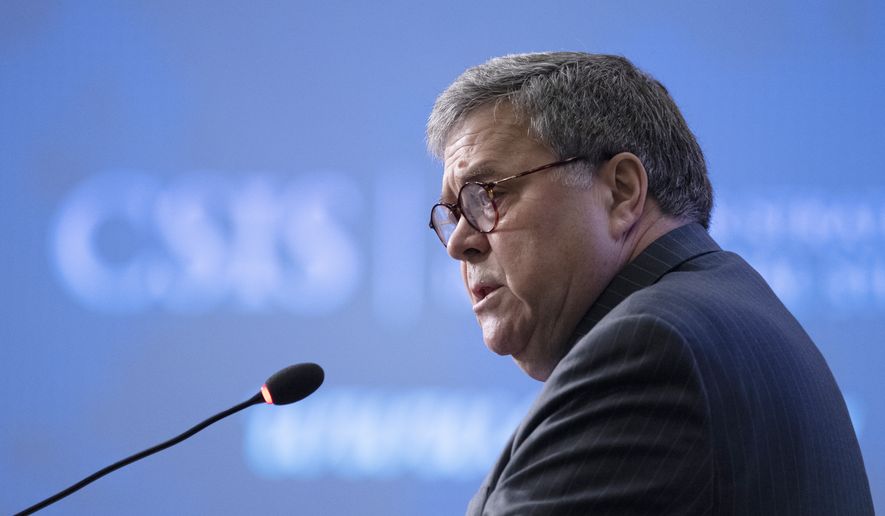Attorney General William Barr warned Thursday that if China wins the battle for control of the world’s 5G wireless networks, it could be devastating for the United States.
“If China establishes sole dominance over 5G, it will be able to dominate the opportunities arising from a stunning range of emerging technologies that will be dependent on and interwoven with the 5G platform,” Mr. Barr said, estimating the 5G network could generate $23 trillion in economic opportunity by 2025.
China rolled out its 5G networks nationwide on Nov. 1, with three of its state-owned carriers offering plans for service. One week later, Beijing announced the launch of research and development into creating a 6G network.
The communist-led country currently controls 40% of the global 5G infrastructure market.
A 5G network operates at a super-fast data speed that can support a range of technologies such as driverless cars. However, it remains in the early stage with most of the world operating on a 4G network.
“The jump to 5G is a quantum leap,” Mr. Barr said in a speech at the Center for Strategic and International Studies in Washington.
Mr. Barr’s comments come as the Trump increases its warnings to be cautious about Chinese investment. Secretary of State Mike Pompeo last month urged other countries to keep Huawei, a Chinese tech giant, from developing 5G networks abroad.
Beyond Beijing’s market dominance, Mr. Barr also cautioned that the Chinese technology creates security concerns because the country can spy on network users.
“That is, in fact, a monumental danger,” he told the crowd.
Mr. Barr said if the world becomes dependent on Chinese 5G technology, its efforts to steal U.S. intellectual property would be unstoppable. The U.S. would have few weapons to protect itself from economic espionage, he said.
“The power the United States has today to use economic sanctions would pale in comparison to the unprecedented economic leverage we would be surrendering into the hands of China,” he said.
The Trump administration in recent months has been trying to develop alternatives to Chinese tech giant Huawei, which is the leader in 5G technology.
“Within the next five years, 5G global territory and application dominance will be determined. The question is whether within this window the United States and its allies can mount sufficient competition to Huawei to retain and capture enough market share to sustain the kind of long-term and robust competitive position necessary to avoid surrendering dominance to China,” he said. “The time is very short.”
FBI Director Christopher Wray also spoke Thursday at CSIS, urging U.S. businesses not to get involved with Chinese companies, because it creates a conduit to intellectual property theft.
“A decision to enter a joint venture or contract with a particular vendor might look good in the near term, might make a lot of money, might sound great on the next earnings call, but it might not look so hot down the road when [U.S. companies] find themselves bleeding intellectual property or hemorrhaging their most sensitive data,” Mr. Wray said.
The FBI currently has nearly 1,000 open investigations into economic espionage and intellectual property theft leading back to China, Mr. Wray said.
It is estimated that Chinese intellectual property theft costs the United States between $225 billion and $600 billion and the average family of four between $4,000 and $6,000 annually.
Arrests of people involved in Chinese operations to seal U.S. corporate secrets and research have increased sharply in recent months. In January, the Justice Department brought separate charges against three individuals — including the chair of Harvard University’s chemistry department and two Chinese nationals — for allegedly helping China pilfer U.S. research.
Mr. Wray said the problem is exacerbated by Beijing pressuring multinational companies doing business in China to establish a branch of the Communist Party as part of its corporate culture.
• Jeff Mordock can be reached at jmordock@washingtontimes.com.




Please read our comment policy before commenting.